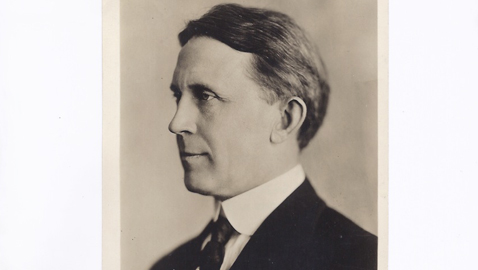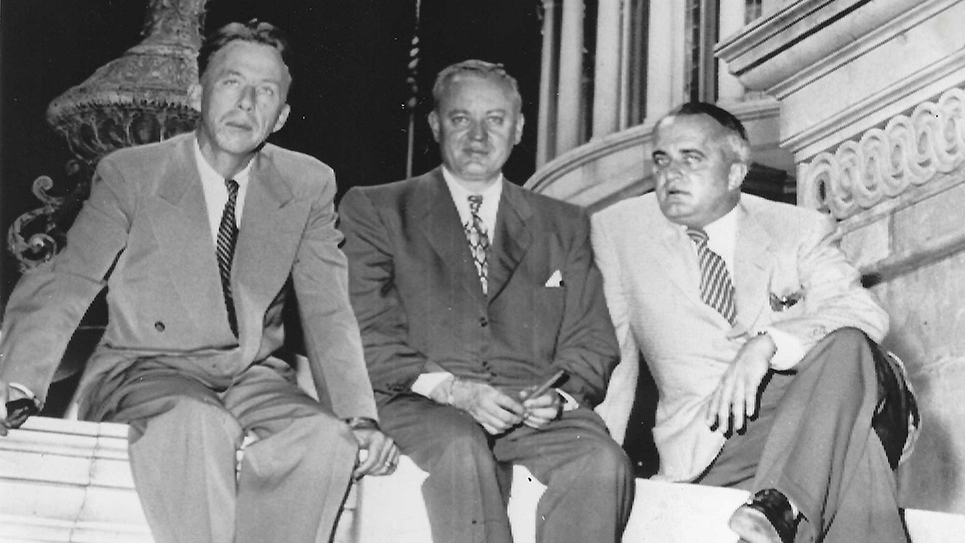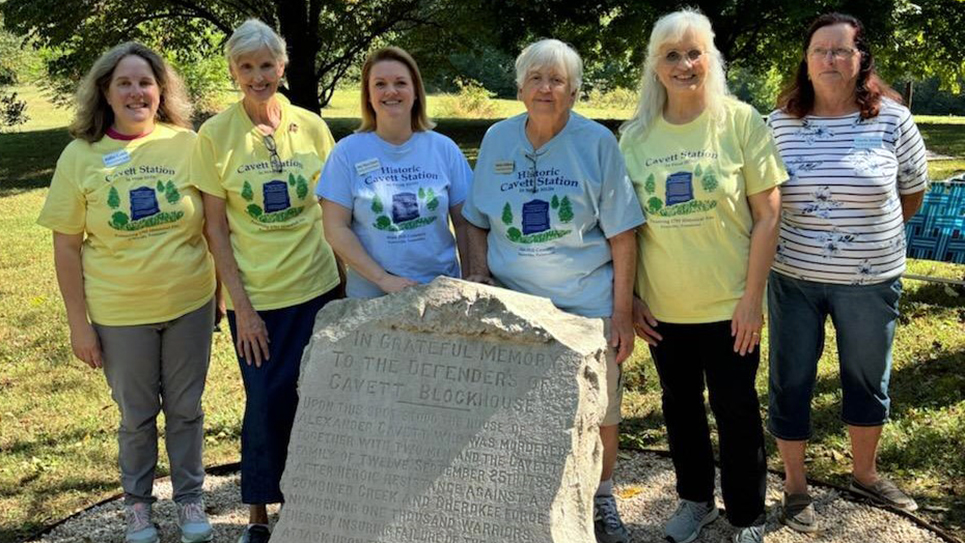By Ray Hill
For years, Ben W. Hooper was the most successful Republican politician in the state of Tennessee, if the measure was the ability to win a statewide election. A fiery and dynamic speaker, Hooper was a successful lawyer, yet he had overcome serious adversity to rise to prominence.
In fact, he came into this world with a different name entirely: Bennie Walter Wade. Born October 13, 1870, Ben W. Hooper was the child of Sarah Wade and Dr. Lemuel Washington Hooper. Hooper was the child of scandal, as his parents were not married at the time of his birth and Dr. Hooper was actually engaged to another woman. Sarah did her best to care for her child, restlessly moving from Jefferson City to New Market, and finally to Knoxville. Despite her best efforts, Sarah found she could not support herself and her child and gave the boy to the St. John’s Orphanage in Knoxville, which was run by the Episcopal Church. It was an experience which profoundly affected Ben Hooper and many years later he wrote his autobiography, which was entitled, “The Unwanted Boy.”
Fortunately, young Ben was retrieved by his natural father when he was nine and, oddly, legally adopted. Dr. Hooper raised Ben in Newport and provided him with the necessities of life and a strict Baptist environment. Ben struggled with the circumstances of his birth, yet it also seemed to give him the motivation to make something out of his life. Apparently, Ben Hooper forgave his father for he named one of his sons after his father.
Hooper graduated from Carson Newman College and later studied law under the supervision of Judge Horace N. Cate.
Young Ben Hooper also demonstrated his personal popularity in his home community, winning a seat in the Tennessee House of Representatives in 1892 when he was only twenty-two years old. Hooper was reelected to a second term in 1894, the same year he was admitted to the Bar to commence the practice of law.
Like many another young man, Ben Hooper felt the pull of service to his country with the outbreak of the Spanish – American War, the conflict which brought Theodore Roosevelt and the charge up San Juan Hill to the country’s notice. Hooper served under another Tennessean who would go on to further acclaim and political success, Colonel Lawrence D. Tyson.
After returning home, Hooper secured a position as an assistant to the U. S. Attorney for the Eastern District of Tennessee. Hooper remained in that post for four years, leaving in 1910 when he made a bid for the governorship.
Success in politics has much to do with timing and the state of Tennessee’s Democratic Party was rife with infighting and political warfare. Democrats had been bitterly divided in 1908 when former U. S. senator Edward Ward Carmack had challenged Governor Malcolm Rice Patterson for renomination. The contest had been fiercely fought, largely around the issue of prohibition. Carmack championed the dry forces, claiming Governor Patterson was little more than a tool of the liquor interests. Following his loss, Carmack became the editor of the Nashville Tennessean, a perch he used to torture Governor Patterson and his friends. Carmack’s poisonous editorials were such that his own friends counseled him not to go about the city without a gun. It was dubious advice and Carmack did indeed travel the streets of Nashville armed, although in the end it did him little good. Carmack had the misfortune to see Colonel Duncan B. Cooper on a Nashville street; Colonel Cooper, the victim of several of Carmack’s acidulous editorials was righteously indignant. The chance meeting erupted into angry tempers and gunfire. When he encountered Colonel Duncan B. Cooper and his son Robin, Carmack apparently fired first, but proved to be less of a marksman than Robin Cooper. Carmack managed to wound the younger Cooper, but Robin fired several shots, killing Carmack, who fell into the gutter, dead.
Charges against Robin Cooper were dismissed on a technicality and Governor Patterson came to the rescue of his friend Colonel Cooper, by pardoning him. Colonel Cooper’s pardon caused many Tennessee Democrats to reel in disbelief and outrage. The outcry was such that Malcolm Patterson, running for a third two-year term in 1910, had to withdraw as a candidate.
With the Democrats so deeply divided, it seemed like the Republican nomination might be worth something that year and Ben W. Hooper had become a candidate. He faced veteran politician and former Congressman Alf A. Taylor for the GOP nomination. Taylor was one of the most formidable figures in Tennessee politics, having contested his own brother, Robert Love Taylor, for the governorship in the famous “War of the Roses”. Despite being the minority party in Tennessee, Republicans had their own divisions and two of the most powerful party leaders, Congressman Walter P. Brownlow and Chattanooga industrialist Newell Sanders, were battling for supremacy. Alf Taylor was supported by the faction headed by Congressman Brownlow, while Newell Sanders strongly backed Hooper for the GOP gubernatorial nomination. Sanders cleverly blended together a confection of Republicans and dissident Democrats opposed to the administration of Governor Patterson. The “Independent Democrats” and Republicans became a “fusion” ticket and helped propel Hooper to the GOP nomination. It would also lead to success in the general election.
With Malcolm Patterson’s withdrawal, Tennessee Democrats scrambled to find a nominee who could win the general election and perhaps unite the shattered party. Ironically, they settled upon Alf Taylor’s brother, former three-term governor and incumbent United States senator, Robert Love Taylor. Senator Taylor required a good deal of convincing, having spent years trying to make it to the United States Senate. Very reluctantly, Bob Taylor agreed to make yet another campaign for governor.
Hooper waged an effective campaign, lambasting the Patterson administration in specific and corruption in general. Thought to be one of the most popular individuals in Tennessee, Bob Taylor anticipated a close election, but ultimately expected to win. He and just about every other Democrat in Tennessee was stunned, when he lost to Hooper. Hooper won just over 133,000 votes, while Taylor garnered over 121,000 votes. Ben W. Hooper was the first Republican to win the governorship in Tennessee since the election of Alvin Hawkins in 1880. Senator Taylor died not long after, some speculating he died of a broken heart from being rejected by his people.
Much to the horror of Tennessee Democrats, if losing the governorship to the Republicans wasn’t bad enough, they had lost control of the House of Representatives where the Fusionists held a majority. The state senate was controlled by Democratic regulars, which enhanced the possibility for conflict. Despite the division in the legislature, Governor Hooper was able to pass several of his initiatives. Prior to his election, state law allowed employers to pay someone else other than a female employee; the money for the woman’s work could go to a relative or a husband, rather than to the woman doing the work. Governor Hooper sought to change the law, requiring employers to pay the female employee directly and the legislature agreed. Hooper also urged the legislature to pass a bill to authorize localities to be able to issue bonds to pay for the construction of much needed hospitals and buy property for schools. The governor was also successful in getting the Tennessee General Assembly to pass a law for pure food and drugs at a time when there was virtually no government regulation of the purity of either.
1911 also saw the election of a senator of the United States from Tennessee. Incumbent James Beriah Frazier of Chattanooga had himself been a former governor and wanted very much to be reelected, but he suffered from his alliance with the late Senator E. W. Carmack. It soon became clear even regular Democrats would not support him for reelection and he withdrew as a candidate. Tennessee Democrats suffered yet another significant political setback when the Fusionists elected Luke Lea, the thirty-year old owner of the Nashville Tennessean, as the new senator. When Senator Robert Love Taylor died unexpectedly in Washington, D. C., Governor Hooper filled the vacancy by appointing his mentor and patron, Newell Sanders to the vacancy in April of 1912. The Fusionists held both Senate seats and the governorship.
Tennessee Democrats furiously attempted to reclaim the governor’s office in 1912 and nominated Benton McMillin, the Old Warhorse of the Democratic Party. McMillin had served in Congress for twenty years before being elected governor and serving two terms. McMillin readily answered the call of his party and campaigned hard. The national Republican Party was seriously divided in 1912 with former President Theodore Roosevelt running against incumbent President William Howard Taft on the Progressive or “Bull Moose” ticket. Democrats hoped the national split in the GOP would affect Hooper’s reelection campaign and a Progressive was nominated for governor. It did not help the Democrats as Hooper won with 124,641 votes to McMillin’s 116,610 votes. The Progressive candidate, William Poston received a meager 4,483 votes.
Governor Hooper began his second term with legislation to help reform education in Tennessee. Hooper insisted children between the ages of eight and fourteen be legally required to attend school. Governor Hooper also placed the responsibility for the transportation of students on local school boards. Hooper signed legislation to provide inspections of state banks, as well as creating a system to allow convicts to receive a parole. Governor Hooper also changed the method of execution for those convicts unlucky enough to receive the death penalty; instead of hanging, they would be electrocuted in the future.
Governor Hooper authorized pensions for not only the veterans of the Civil War, but also for the widows of veterans. Having originally been elected to office over the tumult of prohibition, Ben W. Hooper gleefully presided over changes in Tennessee’s liquor laws. Tennessee banned the interstate shipment of alcoholic beverages. Hooper also supported legislation allowing as few as ten citizens to seek the closure of gambling dens and saloons.
Ben W. Hooper sought a third two-year term in 1914 and Tennessee Democrats nominated Tom C. Rye for governor. Unlike Benton McMillan and Robert L. Taylor, Rye was a fresh face. Rye was aided in his gubernatorial campaign when Democrats adopted prohibition as part of their official platform, cutting the high ground out from under Governor Hooper.
Hooper narrowly lost his bid for reelection, garnering 116,667 votes to Rye’s 137,656 votes.
Ben Hooper returned to Newport, but he had not given up his interest in politics and watched yet another serious division in Tennessee’s Democratic Party erupt as Senator Luke Lea had to face voters in 1916. For the first time in the state’s history, Tennesseans would be popularly electing a member of the United States Senate. Senator Lea badly wished to be reelected, but his constant interference in party affairs and history as a Fusionist caused many regular Democrats to loathe him. Former Governor Malcolm Patterson thought the time right to attempt a comeback and he entered the primary contest. A third candidate emerged in the person of Memphis Congressman Kenneth D. McKellar. Both Lea and Patterson hated one another and paid little attention to Congressman McKellar, who was able to promote himself as the “harmony” candidate, as well as the Democrat best able to win the general election.
Former Governor Ben W. Hooper decided the divisions inside Tennessee’s Democratic Party might once again be the key to victory in November. So many Tennessee Democrats wanted rid of Luke Lea they arranged for the primary election to be held in 1915, a year in advance of the general election. There was also a provision for a run-off election, meaning the two top vote getters in the primary would face each other in another election.
Senator Lea ran a poor third in the Democratic contest and to the surprise of virtually everyone, Congressman McKellar won East and West Tennessee and ran first. McKellar and Patterson, who had carried Middle Tennessee, faced one another in the run off election. Once again, McKellar carried East and West Tennessee and beat Patterson to become the Democratic nominee.
With the nomination of McKellar, Hooper’s hopes of being elected to the United States Senate faded. Had he faced either Lea or Patterson, both of whom had serious liabilities as candidates, Hooper might have won. Still, he ran a credible race in the general election, winning 44% of the vote, the best showing of any GOP candidate for the United States Senate until Howard Baker’s race in 1964.
The election of a Republican president in 1920 led to Hooper being appointed to the national Railroad Labor Board. Later, Hooper became the chief purchasing agent in the acquisition of land for the Great Smoky Mountains National Park. Hooper held that lucrative post until the election of Franklin D. Roosevelt in 1932.
Hooper attempted a political comeback in 1934 and there was even an effort to revive the old Fusionist movement in Tennessee. Lewis Pope had run for governor of Tennessee multiple times and failed to win the nomination; Pope had a habit of bolting the party in the general election and was again furious at having lost to Governor Hill McAlister. Pope ran in the general election as an Independent and allied himself with Ben W. Hooper, who was the Republican nominee for U. S. senator against K. D. McKellar.
The two waged a loud campaign against McAlister and McKellar, but both lost badly. It was the end of Hooper’s political career. He did serve as a delegate to the Constitutional Convention in 1953, which included both former governors Prentice Cooper and Jim Nance McCord. Cooper presided as Chairman, while Hooper was accorded the post of Vice Chairman.
Hooper spent his latter years practicing law, spending time with his wife Anna Belle and their six children and numerous grandchildren. Ben W. Hooper succumbed to pneumonia and died on April 18, 1957; he was eighty-six years old.
The story of Ben W. Hooper is a classic American rise from shame and poverty to success. Ben Hooper was one of the most popular politicians in the state for sometime and remained a highly respected statesman in his later years. Despite being a member of the minority party and oftentimes facing a contentious legislature, Governor Hooper left behind a progressive legacy in many respects.







